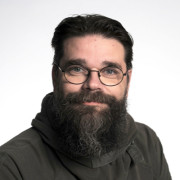When Pekka Metso graduated as a Master of Theology at the end of the last millennium, education in Orthodox theology in eastern Finland was very different than it is now. Increasingly versatile research methods and changes in the world situation add their own nuance to the education.
Education of Orthodox theologians, church musicians and teachers of Orthodox religion began on the Joensuu Campus in 1988. At that time, the Orthodox Seminary of Kuopio was closed down and transferred to the then University of Joensuu. In other words, the roots of Orthodox theology education in Joensuu don’t date back very far.
“I have witnessed academic maturation both in the entire School of Theology, as well as in my own subject. In the early days, the focus was very much on the mission to provide education, and we really couldn’t talk about a research unit. However, thanks to persistent efforts, we’ve managed to transform theology here into an academic, research-oriented discipline. Today, we are the most productive unit in our faculty in terms of the number of scientific articles published by our researchers, when looked at in relation to the number of staff," Professor of Practical Theology Pekka Metso explains.
Metso defended his doctoral dissertation 12 years ago and says that the nature of doing research has changed in this time. While it used to be typical of humanists to do research alone, a new breed of co-research has gained footing in the field of practical theology in recent years.
“The number of articles I’ve authored alone in the past few years can be counted with one hand. In the humanities, too, the trend is towards co-research, even across discipline boundaries. And that’s an entirely positive thing.”
Benefits of collaboration
According to Metso, multidisciplinary themes of research are, of course, more diverse, and they involve valuable dialogue and interaction – even outside the scope of research. In addition, various online solutions enable easy collaborative writing regardless of physical distances.
Metso regards doing research with researchers at different stages of their career as the most valuable form of collaboration.
“A research group may include people who are writing their very first article as well as colleagues who author articles routinely and can provide concrete guidance on writing and publishing. These are very natural situations for passing on tacit knowledge.”
In a research group, the viewpoint and perspective to research is always broader than when doing research alone, even if the topic itself is very specific.
Theology has its place also in the world of science
From time to time, the right of theology to exist within universities is brought to public debate. Those who are not familiar with the matter often see theologians as “advocates of religion and church”.
“Theological research uses the same methodology as literature or cultural research. In terms of methodology, we are like any other discipline. We're just focusing on people's religious beliefs and values.”
“Academic research encompasses people’s experiences and reality. If issues related to theology and religion are completely excluded from research, is that not a distortion of reality? After all, we all know how important and significant a role religions play in world history. It would be crazy to ignore them in research.”
Metso points out that it must be possible to explore and try to understand all sorts of things, even those one holds a critical attitude towards. This adds to our understanding of why, for example, the church or the significance of religion are really important to some people.
“We theologians don’t have any greater social agenda to defend our own topics of research than other researchers do. In research, the church is treated with the same objectivity as any other research topic.”
If issues related to theology and religion are completely excluded from research, is that not a distortion of reality?
Pekka Metso
Professor
Minority research makes majority features visible
Metso’s own research falls within the field of practical theology, which means it largely deals with the experiences of ordinary people – be they religious or not.
“As a researcher of Orthodox theology, my studies naturally focus on the Orthodox Church. In Finland, this means that I’m conducting minority research, which has a value of its own.”
Minority research often makes visible such majority features that would not otherwise necessarily be seen.
“I have approached Orthodox people and their faith from a variety of perspectives. I have studied, among other things, their national and religious identity and their relationship and links with the Lutheran Church, how the Orthodox tradition is passed on in homes, and what the attitude of Orthodox people towards sexual minorities is like.”
“I refer to research on sexuality in the context of sexual minorities within a minority church as double minority research.”

Topical issues under investigation
The COVID-19 pandemic has also been visible in Metso’s research. During lockdown, he studied the effects of the pandemic on people’s coping and well-being from a spiritual perspective. Now he’s working on another topical issue: Reactions from within the churches of Finland to the war in Ukraine. They are being studied by Metso together with Petteri Lalu, an Adjunct Professor at the National Defence University and a Master’s student in theology, as security issues are also involved.
“I’ve also started a multidisciplinary research project in collaboration with scholars of borders. The project is led by Professor Olga Davydova-Minguet, and it addresses, from a cross-border perspective, the culture of dying and death. My own contribution to the project focuses on funeral traditions and wishes in situations where a cross-border setting, i.e., that involving Finland and Russia, brings its own nuance to things.”
“When we started the project, we had no idea that the world situation would change as it has, or that Russia would invade Ukraine.”
“This is why this line of research is now more topical than ever. Anyone who has worked with issues relating to death knows that being a refugee and dealing with themes of war will add to this. This research sheds light on the many layers of being human, and its results are very relevant to care and well-being.”
PEKKA METSO
- Professor of Practical Theology, University of Eastern Finland, 1 August 2022–
- Doctor of Theology, University of Eastern Finland, 2010
- Licentiate of Theology, University of Joensuu, 2002
- Master of Theology, University of Joensuu, 1999
KEY ROLES
- Associate Professor of Practical Theology, University of Eastern Finland, 2018–2022
- Title of Docent in Practical Theology, University of Helsinki, 2019
- University Researcher, University of Eastern Finland, 2014–2018
- Professor of Practical Theology (fixed-term), University of Eastern Finland, 2012–2013
- Lecturer in Systematic Theology, University of Eastern Finland, 2002–2012
Photos of Pekka Metso:
https://mediabank.uef.fi/A/UEF+Media+Bank/49339?encoding=UTF-8 and
https://mediabank.uef.fi/A/UEF+Media+Bank/49338?encoding=UTF-8


